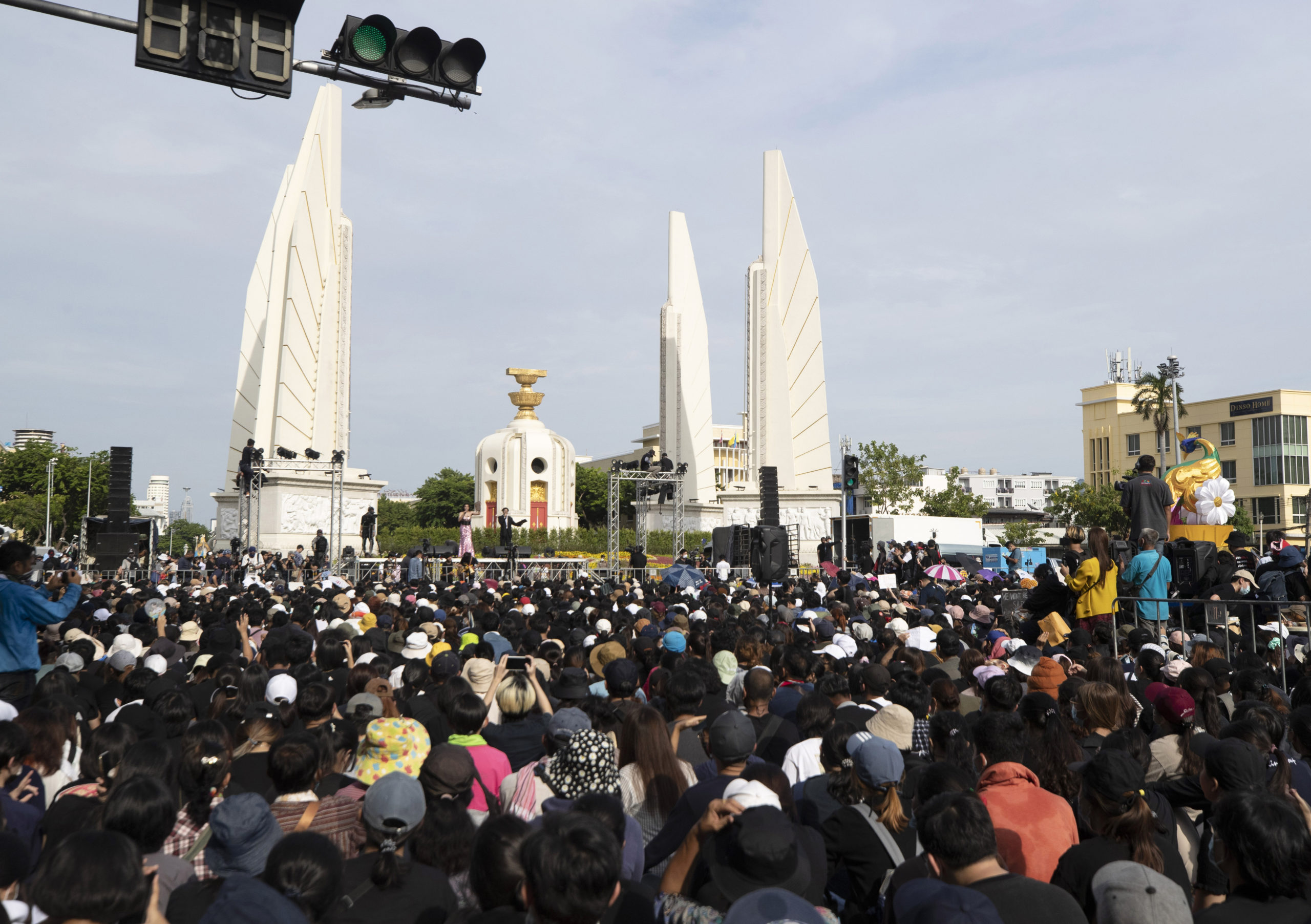
Pro-democracy students gather in front of Democracy Monument during a rally in Bangkok, Thailand, Sunday, Aug, 16, 2020. Protesters have stepped up pressure on the government if it failed to meet their demands, which include holding of new elections, amending the constitution, and an end to intimidation of critics. (AP Photo/Sakchai Lalit)
BANGKOK — Anti-government protesters gathered in large numbers in Thailand’s capital on Sunday for a rally that suggested their movement’s strength may have extended beyond the college campuses where it has blossomed.
Thousands of people assembled at Bangkok’s Democracy Monument, a traditional venue for political activities. Hundreds of police were also present, as well as a small contingent of royalists opposed to the protesters. There was no reliable estimate of the crowd size, though it appeared to be one of the biggest demonstrations in several years.
The student-led movement has three core demands: holding new elections, amending the constitution and ending the intimidation of critics of the government.
“It is clear that students from several generations are the driving force of change in Thai society,” said Narin Isariyasith, a 20-year-old student at Thammasat University.
“We have done this in the past, but Thailand still has no full democracy,” he said. “Dictatorship keeps coming back. And I think it is our duty to end this vicious cycle.”
Thailand has experienced a successful coup roughly every six years on average since the army toppled the absolute monarchy in 1932 and replaced it with a constitutional monarchy. But it has been under military rule for much of the time since then.
As the army chief in 2014, current Prime Minister Prayuth Chan-ocha led a coup ousting an elected government. He then served as prime minister in the military regime that succeeded it and returned as premier after a general election last year. Laws guiding the 2019 election were widely seen as so heavily rigged in Prayuth’s favor that victory was all but guaranteed.
Protest leaders triggered controversy last week when they expanded their agenda, publicly criticizing Thailand’s constitutional monarchy and issuing a 10-point manifesto calling for its reform.
Their action was virtually unprecedented, as the monarchy is considered sacrosanct in Thailand, and any criticism is normally kept private. A lese majeste law calls for a prison sentence of three to 15 years for anyone found guilty of defaming the royal institution.
The sensitivity of the issue was illustrated by the failure of most mainstream Thai media to report in any detail on the students’ manifesto about the monarchy.
Police have arrested several protest leaders and charged them with sedition for statements made at a small rally in July. They were released on bail and vowed to attend Sunday’s rally, in what appeared to be a defiance of the terms of their release.
Many young people at Sunday’s protest were undeterred.
A 10th-grade student from Satriwithaya School, an elite secondary school for girls, said it was not the first protest she had attended. The 14-year-old, who gave her name only as Pang, was with friends at a table selling books and other items to raise funds for the protest movement.
“I came to this protest today because I want to express my standpoint in opposing the dictatorship, asking for equal rights and having a better future,” she said.
It has been unclear how the escalation of the activists’ demands to include the monarchy has affected the popularity of the movement since it could alienate some followers or make them fearful that the authorities will crack down heavily on them.
The government may also be faced with a dilemma since it is committed to defending the royal institution but likely wary of acting with too heavy a hand that might tilt public support to the protesters.
Prime Minister Prayuth’s government has done well in coping with the health aspects of the coronavirus, but its management of the economy had been lackluster even before COVID-19 battered it.
Royalists have responded to the student movement by defending the monarchy in online statements and petitions, and in-person with a small presence adjacent to Sunday’s rally. They declared earlier that they were there to observe and bear witness to any insults to the monarchy.